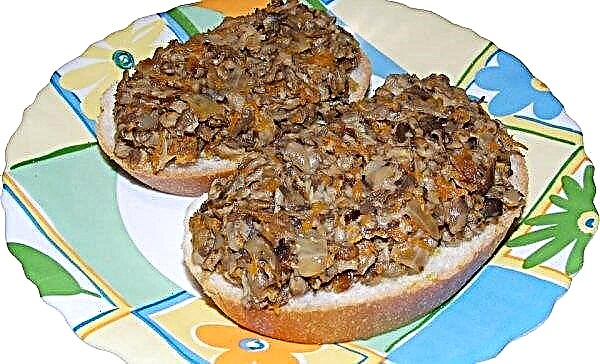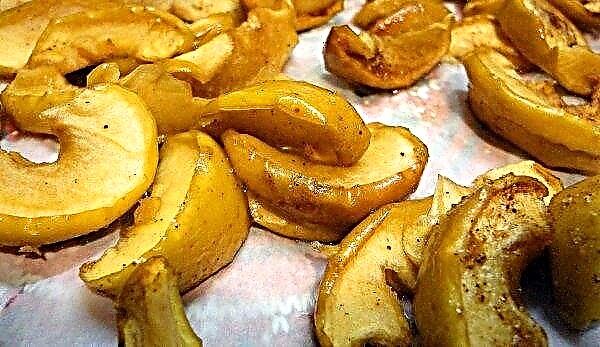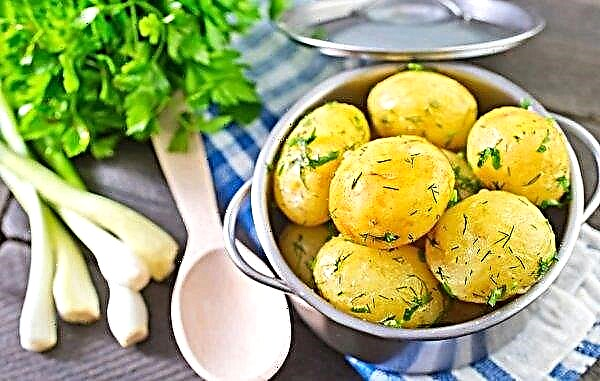During pregnancy, the expectant mother is responsible not only for her health, but also for the fetus that develops inside her. Not all products may be useful at this stage of life. This material discusses how to properly use ginger in the diet of expectant mothers.
Chemical and vitamin composition of ginger
The energy value of the product is as follows (per 100 g):
- calorie content: 80 kcal;
- proteins 1.8 g;
- fats: 0.8 g;
- carbohydrates: 15.8 g;
- water: 79 g.
Did you know? Russian gingerbread owes its name to ginger. Favorite in Russia gingerbread cookies, which were imported from Europe, tried to recreate local culinary specialists. They added various spices, from where the name "gingerbread" came from.
Of the vitamins in the ginger root, most of the compounds of group B (% by weight of the product):
- B6 (pyridoxine) - 8%;
- B5 (pantothenic acid) - 4%;
- B9 (folic acid) - 3%;
- B1 (thiamine) - 2%;
- B2 (riboflavin) - 2%.
In addition to them, there are vitamins C (6%) and E (2%), the rest are presented in small quantities.

| Macronutrients (in mg per 100 g): | Trace elements (in mg per 100 g): |
| potassium - 415 | zinc - 0.34 |
| magnesium - 43 | copper - 0.23 |
| phosphorus - 34 | Manganese - 0.23 |
| calcium - 16 | iron - 0.06 |
| sodium - 13 | selenium - 0.007 |

Can I use ginger during pregnancy?
Ginger tea is an excellent sedative that can replace valerian or motherwort tincture. The drink can be taken during pregnancy, but for this it is better to consult your gynecologist and adhere to the instructions for use, agreed with the doctor.
Did you know? The healing properties of ginger are not limited to eliminating the symptoms of toxicosis in pregnant women. In the Middle Ages, this tool was used as the main tool for the prevention of such a deadly disease as the plague.
- The benefits of using the product are:
- calms the nervous system;
- tidying up the gastrointestinal tract;
- normalizes uterine tone;
- removes excess fluids from the body, relieving swelling;
- relieves symptoms of toxicosis.

- The root is also harmful to the health of the expectant mother:
- contraindicated in hypertension and cardiovascular diseases;
- undesirable for liver disease, biliary tract and hemorrhoids;
- dilutes blood, causing bleeding.
In the early stages
Early pregnancy is characterized by toxicosis and the resulting nausea and weakness, when you do not want to eat or do anything. The root of the plant can help remove toxins, normalize the stomach and intestines, and restore vitality in the first trimester. At the beginning of gestation, ginger only benefits.
In the 2nd trimester
At this time, the fetus is actively formed, and any food taken by the mother affects this process. Vitamins, micro and macro elements that are in the ginger product can enrich the pregnant woman’s diet. However, ginger should be used in the second trimester only after consulting a doctor.

On the condition of the future baby, this product does not appear in any way, but the woman is threatened with increased gas formation and diarrhea. During this period, the pickled root is excluded - it can cause early milk production. Ginger is used only in fresh or dried form, in the form of a decoction or additives in tea with a small amount of honey instead of sugar.
In late terms
Late pregnancy is characterized by the final formation of the fetus, so any nutritional experiments with the mother's body can affect the health of an almost developed baby. In the case of ginger, it has the properties of thinning the blood. This is fraught with serious and difficult to stop bleeding in the prenatal period and during childbirth.
Important! In late pregnancy, it is necessary to refuse to eat this product in order not to harm the health of mothers and children.
Basic rules for use
Daily should not eat more than 1 g of ground root. Teas and fees sold in shops and pharmacies are not suitable for pregnant women, since their composition is questionable and you can not drink them. But raw ginger is very healthy and can be taken in several large quantities. The broth is brewed from the calculation: 3 tbsp. l grated root on a grater of 1.5 liters of boiling water.

The product is added to regular or green tea instead of lemon or to sea-buckthorn decoction, which helps to prevent colds and coughs, disturbances in the digestive tract, and improves mood. And the good condition of the mother is certainly transmitted to her fetus. To give a new flavor to the drink, you can use a little red cinnamon, putting it in tea at the very tip of the knife.
There are two polar reviews regarding the use of pickled roots by pregnant women for food. Some people think that it can be harmful to health, others say that in the early stages of pregnancy it is useful.
Important! Consultation with a doctor is necessary at every stage of pregnancy, since each organism can respond differently to ginger root.
What can be combined with
Here the question is not what products the root is combined with, and which of these products are not contraindicated for the future mother in childbirth. If everything is clear with ginger itself, then in the composition of fresh dishes or dry mixes, pregnant women need to eat it with caution, knowing exactly all the ingredients. Diet planning is an important process for a pregnant woman, where every ingredient needs to be given attention.

Ginger can be used to emphasize the taste of fruit compotes, add to neutral mousses and puddings. The root is added to vegetable sauté and many meat dishes to shade the remaining components and soften the taste. Many culinary experts say that this ingredient can decorate any dish - from ordinary tea to culinary delights. But during pregnancy, even with him, you must be careful.
When planning a diet, we suggest that you familiarize yourself with the features of the use of such products during pregnancy as cabbage, prunes, pear, caraway seeds, carrots, parsley, celery, onions, dill, raspberries, strawberries and chickpeas.
Contraindications
Above, some disadvantages of consuming ginger during gestation were already indicated.
- The following cases can be distinguished, why you should not eat it:
- high pressure;
- diseases of the cardiovascular system;
- liver failure;
- problems with the biliary tract;
- hemorrhoids;
- heartburn;
- blood thinning.
In general, ginger is an excellent helper for expectant mother and as a source of vitamins and nutrients, and as a remedy for toxicosis, and as a panacea for certain diseases. This root can be included in many dietary dishes and diversify a reduced diet of a pregnant woman.












